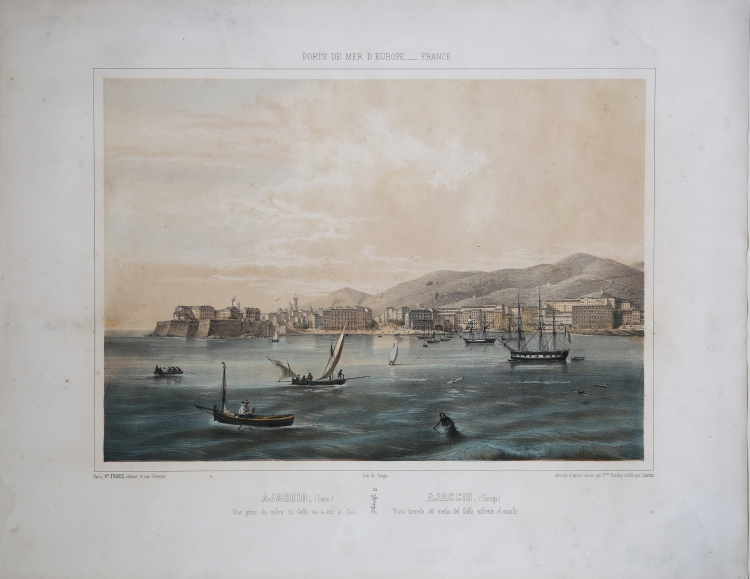


| Reference: | S41905 |
| Author | Louis Auguste TURGIS |
| Year: | 1850 ca. |
| Zone: | Ajaccio |
| Measures: | 460 x 380 mm |


| Reference: | S41905 |
| Author | Louis Auguste TURGIS |
| Year: | 1850 ca. |
| Zone: | Ajaccio |
| Measures: | 460 x 380 mm |
Tinted lithograph with watercolor, about 1840/50, signed at the bottom right.
Magnificent proof, printed on contemporary paper, numerous restored abrasions on the verso, otherwise in good condition.
The works belong to the series called Ports de Mer d'Europe, created in collaboration between Deroy and André Chapuy.
The views were published by the publisher Turgis both in Paris and in New York.
Louis Auguste TURGIS (1818-1894)
|
Louis Auguste Turgis (Gouville dans la Manche, 1818 – Paris, 1894), was a French printer and publisher. Very little information is available on this individual despite the obvious influence he had on the print trade around Europe and in New York at the time. His father was a print merchant in Paris from at least 1828. Louis Le Jeune joined the business around 1856. Between 1851 and 1874, the business was dedicated almost exclusively to religious imagery. They had workshops in Paris (rue des Écoles, 60), in Toulouse and a branch in New York (78 Duane St.). His wife took over the business (Maison Turgis) after his death and up to the Second World War.
|
Louis Auguste TURGIS (1818-1894)
|
Louis Auguste Turgis (Gouville dans la Manche, 1818 – Paris, 1894), was a French printer and publisher. Very little information is available on this individual despite the obvious influence he had on the print trade around Europe and in New York at the time. His father was a print merchant in Paris from at least 1828. Louis Le Jeune joined the business around 1856. Between 1851 and 1874, the business was dedicated almost exclusively to religious imagery. They had workshops in Paris (rue des Écoles, 60), in Toulouse and a branch in New York (78 Duane St.). His wife took over the business (Maison Turgis) after his death and up to the Second World War.
|